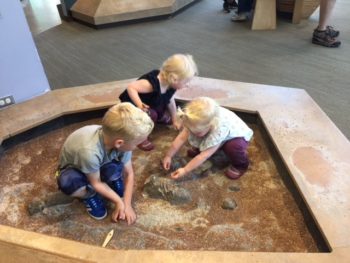Sensory Adventures: Kids’  Summer Activities
Summer Activities
As the sun shines brightly and the days grow longer, summer calls for adventures that engage the senses and spark creativity. For children, the summer break provides the perfect opportunity to explore the world through sensory experiences that stimulate learning, foster development, and create lasting memories. In this blog post, we’ll discover a variety of sensory activities that you can enjoy with children over the summer months.
- Sensory Bins:
- Create sensory bins filled with materials such as rice, dried beans, sand, or water beads.
- Add scoops, funnels, measuring cups, and small toys for scooping, pouring, and sorting.
- Encourage exploration and imaginative play as children dig their hands into the sensory materials, discovering textures, shapes, and colors.
- Nature Scavenger Hunt:
- Embark on a nature scavenger hunt in your backyard, local park, or nature reserve.
- Provide a list of items to find, such as leaves, rocks, flowers, or pinecones.
- Encourage children to use their senses to observe, touch, smell, and listen to the natural world around them as they search for treasures.
- Messy Art Play:
- Set up a messy art station outdoors using materials like finger paint, shaving cream, or colored sand.
- Provide large sheets of paper, cardboard, or easels for children to express their creativity.
- Embrace the messiness as children use their hands and fingers to paint, smear, and mix colors, engaging their senses in the artistic process.
- Water Play:
- Beat the summer heat with water play activities such as water tables, sprinklers, or kiddie pools.
- Add water toys, sponges, spray bottles, and containers for pouring and splashing fun.
- Experiment with adding ice cubes, food coloring, or bath toys to enhance the sensory experience.
- Sensory Walks:
- Take sensory walks around your neighborhood or local community, focusing on different senses with each outing.
- Encourage children to notice the sights, sounds, smells, and textures they encounter along the way.
- Use a sensory scavenger hunt checklist or create a sensory nature journal to document observations and discoveries.
- Do-It-Yourself Sensory Playdough:
- Make homemade sensory playdough using simple ingredients like flour, salt, water, and food coloring.
- Experiment with adding scents (e.g., vanilla, lavender) or textured materials (e.g., glitter, rice) to create unique sensory experiences.
- Encourage children to knead, squeeze, and mold the playdough to strengthen fine motor skills and stimulate tactile senses.
- Sensory Storytime:
- Host sensory story time sessions at home or in your backyard, featuring books that engage multiple senses.
- Choose books with interactive elements such as textured pages, scratch-and-sniff scents, or sound effects.
- Encourage children to participate in the story by acting out scenes, making sound effects, or creating sensory props.
- Outdoor Sensory Obstacle Course:
- Design an outdoor sensory obstacle course using household items and natural materials.
- Incorporate activities such as balancing on a beam, crawling through tunnels, jumping over obstacles, or stepping on sensory pathways (e.g., grass, sand).
- Encourage children to navigate the course using their senses of balance, coordination, and proprioception.
- Texture Exploration:
- Set up a texture exploration station with a variety of tactile materials such as fabric swatches, foam shapes, textured balls, and sensory bags filled with gel or beads.
- Encourage children to touch, squeeze, and explore the different textures, describing how each feels.
- Outdoor Music and Dance Party:
- Host an outdoor music and dance party in your backyard or local park.
- Provide musical instruments, such as drums, tambourines, or shakers, for children to play along with the music.
- Encourage children to move and dance freely, expressing themselves through rhythm and movement.
Summer is a time of exploration, discovery, and sensory delight for children. By engaging in sensory activities that stimulate the senses and ignite the imagination, parents can create memorable experiences that promote learning, development, and connection. Whether it’s digging in a sensory bin, splashing in water play, or embarking on a nature scavenger hunt, the possibilities for sensory adventures are endless. So, grab your sunscreen, put on your explorer hats, and get ready for a summer filled with sensory fun!

Alison Whiteley has been a special education teacher for over 15 years, spending most of her time working with elementary students and families. After graduating from the University of Colorado with a Bachelor of Arts in Special Education and Psychology, she continued her education with a Masters in Reading from Walden University. In addition, she has achieved endorsements supporting Early Childhood Special Education and Diverse Learners which she uses to help identify needs across all learners.
Ms. Whiteley is trained in Wilson Reading System and Yoshimoto Orton-Gillingham. She believes all students can learn to read and be successful. She has served as a Special Education Coach and Mentor to fellow specialists and teachers, facilitated the creation of her elementary school’s Response to Intervention/Multi-Tiered Systems of Support (RTI/MTSS) process and helped parents through the Special Education process as IEP Coach for parents. In 2013 she completed the National Boards of Professional Teaching in Exceptional Needs with recertification in 2022. Her areas of expertise involve working with students with learning disabilities, supporting stakeholders moving through the special education process, and helping parents and teachers understand what they can do to support struggling learners in the public school settings.
She is a founding member of the Colorado Reading League and a member of the International Dyslexia Association in Colorado. Alison has two greyhounds and two nephews who keep her busy outside of school. She is the CEO of Toad-ally Exceptional Learners at http://www.toad-allyexceptionallearners.com. Alison is a valuable source of information to support teachers and parents, although she is not a lawyer and does not give legal advice. Her services support families through the IEP process and how they can be an equal member of the team through positive interactions. She focuses on collaboration and using tools to take IEPs to the new level of helping students achieve.

